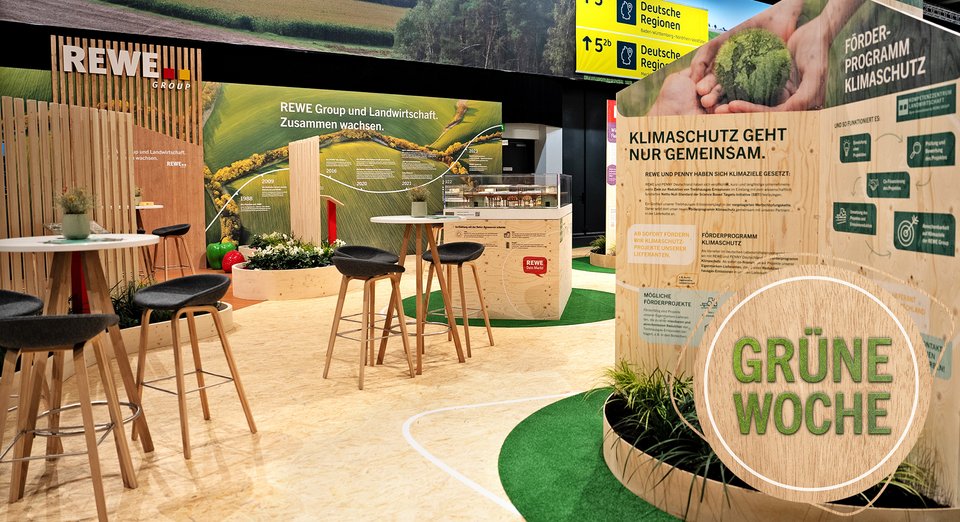
Greenhouse gas emissions are generated at many points in the supply chain. With the "Climate Protection Promotion Programme", we want to actively support measures that help to reduce these emissions. We presented the REWE and PENNY programme under the umbrella of the Competence Centre for Agriculture for the first time at the Green Week.
The aim is to co-finance projects by own-brand suppliers to reduce greenhouse gas emissions in their supply chain with a budget worth millions. Domestic agriculture also benefits from the funding mechanism for investments in climate protection.
Wide range of funding projects possible Hans-Jürgen Moog
"Whether in agriculture, animal husbandry, processing, packaging or transporting food - greenhouse gas emissions are generated everywhere. However, measures to reduce these are complex and cost-intensive. This is where the Climate Protection Promotion Programme comes in and supports projects of REWE and PENNY's own-brand suppliers," says Hans-Jürgen Moog, the REWE Group Management Board member responsible for merchandise and purchasing. "The range of subsidised projects extends from regenerative agriculture, such as planting flower strips, to measures that contribute to reducing food losses within the value chain. It is not important whether the measures are already known or innovative. However, a prerequisite for funding is that the measures always lead to a creditable, additional and permanent reduction in emissions."
Hans-Jürgen Moog
"Whether in agriculture, animal husbandry, processing, packaging or transporting food - greenhouse gas emissions are generated everywhere. However, measures to reduce these are complex and cost-intensive. This is where the Climate Protection Promotion Programme comes in and supports projects of REWE and PENNY's own-brand suppliers," says Hans-Jürgen Moog, the REWE Group Management Board member responsible for merchandise and purchasing. "The range of subsidised projects extends from regenerative agriculture, such as planting flower strips, to measures that contribute to reducing food losses within the value chain. It is not important whether the measures are already known or innovative. However, a prerequisite for funding is that the measures always lead to a creditable, additional and permanent reduction in emissions."
98 per cent of emissions outside the influence of REWE Group
Our consistent climate strategy is intended to contribute to achieving the Paris Climate Agreement and limiting the global temperature increase to below 1.5 degrees Celsius if possible. REWE and PENNY in Germany have therefore committed to setting short and long-term company-wide reduction targets in line with the science-based net-zero standard of the Science Based Targets initiative (SBTi*). The SBTi membership - and REWE Group's net-zero target by 2050 - provided the impetus for the climate protection support programme that has now been initiated. This is because 98 per cent of REWE and PENNY's greenhouse gas emissions in Germany are generated in the upstream value chains, for example in animal husbandry, the cultivation or harvesting of food, its processing and transport. A decisive lever for achieving the climate targets therefore lies with REWE Group's own-brand suppliers and their upstream suppliers, including domestic agriculture. The aim is to agree climate targets in line with the SBTi with all strategic own-brand suppliers of REWE and PENNY in Germany, which are responsible for 75 per cent of product-related emissions, by the end of 2024. This is precisely where the climate protection support programme comes in with its investment incentive. In addition, the initiative strengthens close cooperation along the supply chain in terms of climate protection and also supports agriculture in becoming "climate-ready" and mitigating the possible consequences of climate change on its yields.
Quantified and evaluated reduction projects
Measures by REWE and PENNY own-brand suppliers that contribute to a measurable and creditable reduction of greenhouse gas emissions in the supply chains, for example in the areas of arable and crop farming, animal husbandry, processing, packaging and transport, are now eligible for funding. The project ideas submitted will undergo a corresponding review and assessment, on the basis of which a decision will be made on possible co-financing. "With the climate protection funding programme, REWE Group is taking the next step towards achieving its climate targets and also wants to help shape the transformation of sustainable German agriculture. We know that we can only take this path together with our suppliers and look forward to exciting projects," emphasises Moog.
If you have any questions or suggestions regarding the climate protection support programme or the application process, please contact klimaschutzrewe-groupcom and find more information at: Competence Centre Agriculture.
*The SBTi is an association of the partners CDP, United Nations Global Compact, Word Resources Institute (WIR) and the World Wide Fund for Nature (WWF) and works closely with scientific institutions to develop climate targets that are in line with the requirements of the Paris Agreement.
